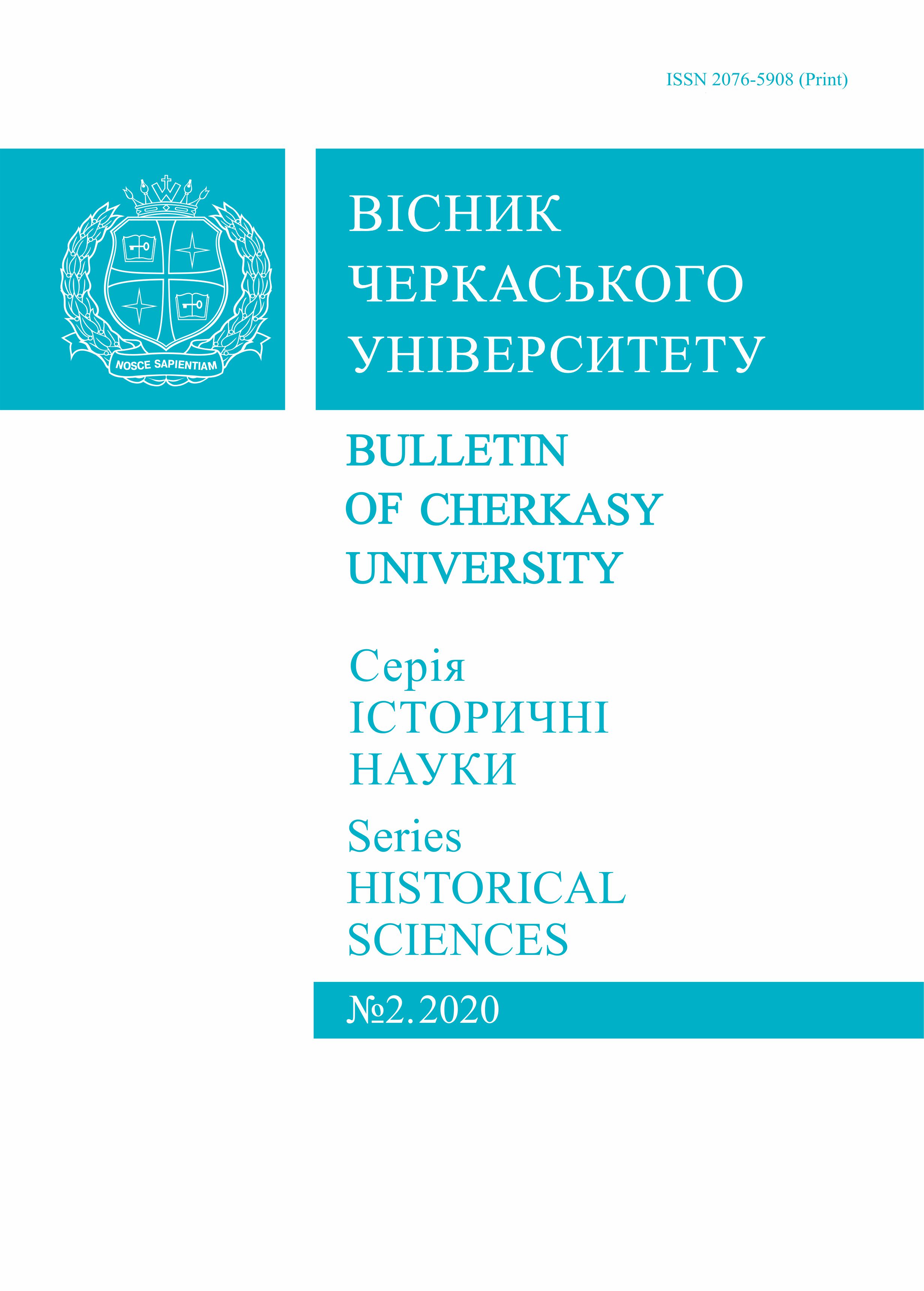The «Afghan Question» at the sixth emergency special session of the United Nations General Assembly (10–14 January 1980)
Main Article Content
Abstract
Abstract. Introduction. Soviet invasion to the Democratic Republic of Afghanistan in December 1979 and continued participation of the USSR in the Afghan crisis became the most high-profile event of international life of 1970 – 80-th. The world community perceived Soviet intervention as a significant threat to international peace and security. The Sixth emergency special session of the United Nations General Assembly was held to consider the situation in Afghanistan.
The purpose of the article is to investigate the discussion of the «Afghan issue» at the Sixth emergency special session of the United Nations General Assembly 10 – 14 january 1980 and to analyze the impact of the «Afghan issue» on the system of international relations during the Cold War.
Results. The Security Council met from 5 to 9 January 1980 to consider the situation in Afghanistan and its implications for international peace and security.
A draft resolution calling for the immediate, unconditional and total withdrawal of the foreign troops was vetoed by the Soviets on 7 January. Two days later the Security Council adopted Resolution 462 acknowledging the lack of unanimity of its permanent members was preventing them from fulfilling their primary duty of maintaining peace and security, invoking the General Assembly’s «Uniting for Peace» resolution calling for an emergency special session. This was adopted with 12 supports, 2 opposes (USSR and German Democratic Republic), with 1 abstention (Zambia).
At the Sixth emergency special session was dominated by questions of its legitimacy. Afghanistan and the Soviet Union denounced the meeting as interfering with domestic affairs of a Member State and that they were exercising their Treaty of Friendship and their right to collective self-defense under Article 51 of the UN Charter. Most of the delegations rejected the arguments of the Soviet and Afghan sides. 108 countries condemned the Soviet aggression on January, 14 (18 countries abstained, the same number supported the USSR).
Conclusion. The General Assembly adopted Resolution ES-6/2 strongly deploring the recent armed intervention in Afghanistan and calls for the immediate, unconditional and total withdrawal of the foreign troops from Afghanistan. However, the decisions of the General Assembly were recommendatory. In addition, the consideration of the «Afghan issue » at the United Nations has shown the lack of a mechanism for influencing an aggressor country that has a veto power in the UN Security Council. These events also marked the transition to a new phase of the Cold War in international relations.
Article Details
References
Kostyrya, A. A. (2009). Historiography, historical source study, bibliography of special operation of the USSR in Afghanistan (1979 – 1989). Donetsk: OOO «IPP Promin» (in Russ.)
Punzhin, S. M. (1990). The entry of Soviet troops into Afghanistan: international legal problems. Sovetskoe gosudarstvo i pravo (Soviet state and law), 5, 123 – 130 (in Russ.)
Hristoforov, V. S. (2014). Political settlement of the Afghan problem in the context of international relations in the 1980s. Vestnik Rossijskogo gosudarstvennogo gumanitarnogo universiteta (Bulletin of the Russian State University for the Humanities), 18, 116 – 125 (in Russ.)
Rabush, T. V. (2018). The Afghan Question in the 1980s and UN Resolutions. Vestnik Rossiyskogo gosudarstvennogo gumanitarnogo universiteta (Bulletin of the Northern (Arctic) Federal University), 5, 15 – 24 (in Russ.)
Kovalkov, O. L. (2018). The «Afghan question» in the work of SC & GA of UNO in January, 1980. Universum Historiae et Archeologiae = The Universe of History and Archeology = Universum istorii ta arkheolohii = Unyversum ystoryy y arkheolohyy, 1(26), 81 – 93 (in Ukr.)
Brachev, V. S., Polyinov, M. F. (2019). USSR Policy on Afghanistan in 1978 – 1991. Nauchnyi dialog (Scientific dialogue), 246 – 261 (in Rus.)
Grossman, A. S. (1993). Secret documents from special folders. Afghanistan: Twentieth Century Political Archive. Voprosy istorii (History issues), 3, 3 – 33 (in Rus.)
Truth (1980). Moscow, January 13 (in Rus.)
Truth (1979). Moscow, December 29 (in Rus.)
UN. GA. Official records. Sixth emergency special session. 1st plenary metting (1980). New York, January 10, 1 – 14
UN. GA. Official records. Sixth emergency special session. 2nd plenary metting (1980). New York, January 11, 15 – 29
Troyanovs’kij, O. (1997). Through Years and Distances. Vagrius. Retrieved from http: // www.profilib.com/chtenie/134241/oleg-troyanovskiy-cherez-gody-i-rasstoyaniya-istoriya-odnoy-semi-62.php (in Rus.)
Charter of the United Nations (2008). The UN Department of Public Information. Retrieved from http://www.un.org.ua/images/UN_Charter_Ukrainianpdf (in Ukr.)
UN. GA. Official records. Sixth emergency special session. 3rd plenary metting (1980). New York, January 11, 31 – 46
UN. GA. Official records. Sixth emergency special session. 4th plenary metting (1980). New York, January 12, 47 – 59
Novychenko, I. L., Stepanov, V. P., Kostenko, Yu. V. (1984). Ukrainian SSR at the international arena. Kyiv: Politvydav Ukrainy (Political Publishing House of Ukraine) (in Ukr.)
UN. GA. Official records. Sixth emergency special session. 5th plenary metting (1980). New York, January 12, 61 – 79
UN. GA. Official records. Sixth emergency special session. 6th plenary metting (1980). New York, January 12, 81 – 93
UN. GA. Official records. Sixth emergency special session. 7th plenary metting (1980). New York, January 12, 95 – 117
Kovalkov, O. L. (2014). Propaganda support of the Soviet invasion of Afghanistan. Naukovi zapysky KDPU im. V. Vynnychenka (Proceedings Volodymyr Vynnychenko Kirovograd State Pedagogical University), 19, 123 – 129 (in Ukr.)
Rubtsov, Yu. V. (2009). Soviet Union in the undeclared war in Afghanistan (1979 – 1989). Novaya i noveyshaya istoriya (New and recent history), 1, 48 – 71 (in Rus.)
Tanner, S. Afghanistan (2002). A Military History From Alexander The Great To The Fall Of The Taliban. Cambridge: Da Capo Press

